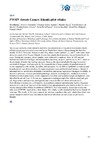Identificador persistente para citar o vincular este elemento:
https://accedacris.ulpgc.es/jspui/handle/10553/71338
| Título: | PWMV threats Canary Islands pilot whales | Autores/as: | Sierra Pulpillo, Eva María Fernandez, Antonio Suarez Santana, Cristian Manuel Zucca, Daniele Bernaldo de Quirós Miranda, Yara García-Álvarez, Natalia De La Fuente Marquez, Jesus Sacchini , Simona Diaz Delgado, Josue Arbelo Hernández, Manuel Antonio |
Clasificación UNESCO: | 310907 Patología 3109 Ciencias veterinarias |
Fecha de publicación: | 2016 | Resumen: | An unusual mortality event related to morbillivirus infection involving short-finned pilot whales (Globicephala macrorhynchus) occurred in the North-East Atlantic Ocean during the first five months of 2015. From mid-January to end-May, three whales (animal 1, 2, and 3) were found dead along the coasts of the Canary Islands. A complete standardized necropsy was performed in all the cases. During the necropsy, tissue samples were collected in duplicate: fixed in 10% neutral buffered formalin for histologic and immunohistochemistry analyses, and frozen at -80ºC, until the development of molecular virology analysis. Grossly, the most remarkable findings in animal 1 consisted of clogged nasal passages by the accumulation of large quantity of purulent material, severe suppurative otitis media, sacculitis, and laryngitis. Severe diffuse epithelial hyperplasia and hyperkeratosis was observed along the upper respiratory tract and keratinized stomach. Animal 2 presented severe proliferative dermatitis and cheilitis, and severe suppurative laryngeal tonsillitis. In animal 3, advanced autolysis precluded pathologic analysis. Histologically, moderate multifocal bronchointerstitial pneumonia, severe suppurative tonsillitis and systemic lymphoid depletion were identified in animal 1 and 2. Severe non-suppurative meningoencephalitis with neuronal and glial cell degeneration and necrosis, microgliosis and syncytial cells was observed in animal 2. Morbillivirus infection was confirmed by immunohistochemical and molecular studies. Sequence analysis of a conserved fragment of the morbillivirus phosphoprotein gene indicates that the virus is closely related to Pilot Whale Morbillivirus (PWMV). The virus strain is almost identical to the only case of PWMV reported in a short-finned pilot whale, which stranded in the Canary Islands 19 years ago. The results of this study support the previous hypothesis that pilot whales have their own species-adapted morbillivirus, but indicate that lethal infections are not as rare as previously thought. | URI: | https://accedacris.ulpgc.es/handle/10553/71338 | Fuente: | 30th Annual Conference of the European Cetacean Society. Madeira, Portugal, 14-16 March 2016 / Luís Freitas; Cláudia Ribeiro (ed.), p. 241 |
| Colección: | Actas de congresos |
Visitas
59
actualizado el 10-ene-2026
Descargas
11
actualizado el 10-ene-2026
Google ScholarTM
Verifica
Comparte
Exporta metadatos
Los elementos en ULPGC accedaCRIS están protegidos por derechos de autor con todos los derechos reservados, a menos que se indique lo contrario.
